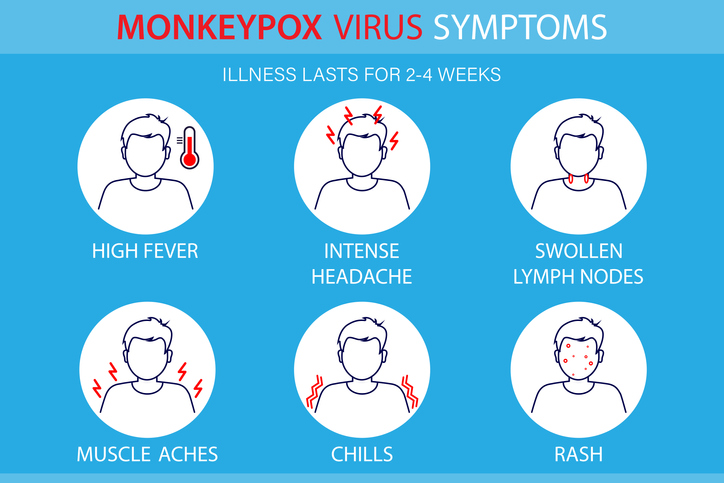Monkeypox is a viral zoonosis (a virus transmitted to humans from animals) with symptoms similar to those seen in the past in smallpox patients, although it is clinically less severe. With the eradication of smallpox in 1980 and subsequent cessation of smallpox vaccination, monkeypox has emerged as the most important orthopoxvirus for public health.
According to the CDC, People with monkeypox get a rash that may be located on or near the genitals (penis, testicles, labia, and vagina) or anus (butthole) and could be on other areas like the hands, feet, chest, face, or mouth.
- The rash will go through several stages, including scabs, before healing.
- The rash can initially look like pimples or blisters and may be painful or itchy.
Other symptoms of monkeypox can include:
- Fever
- Chills
- Swollen lymph nodes
- Exhaustion
- Muscle aches and backache
- Headache
- Respiratory symptoms (e.g. sore throat, nasal congestion, or cough)
You may experience all or only a few symptoms
- Sometimes, people have flu-like symptoms before the rash.
- Some people get a rash first, followed by other symptoms.
- Others only experience a rash.
How long do monkeypox symptoms last?
Monkeypox symptoms usually start within 3 weeks of exposure to the virus. If someone has flu-like symptoms, they will usually develop a rash 1-4 days later.
Monkeypox can be spread from the time symptoms start until the rash has healed, all scabs have fallen off, and a fresh layer of skin has formed. The illness typically lasts 2-4 weeks.
- Avoid close contact, including sex or being intimate with anyone, until you have been checked out by a healthcare provider.
- If you don’t have a provider or health insurance, visit a public health clinic near you.
- When you see a healthcare provider, wear a mask, and remind them that this virus is circulating in the area.
While CDC works to contain the current monkeypox outbreak and learn more about the virus, here is information that can help you make informed choices when you are in situations or places where monkeypox could be spread. Monkeypox is not considered a sexually transmitted disease, but it is often transmitted through close, sustained physical contact, which can include sexual contact.
CDC recommends vaccination for people who have been exposed to monkeypox and people who are at higher risk of being exposed to monkeypox.


